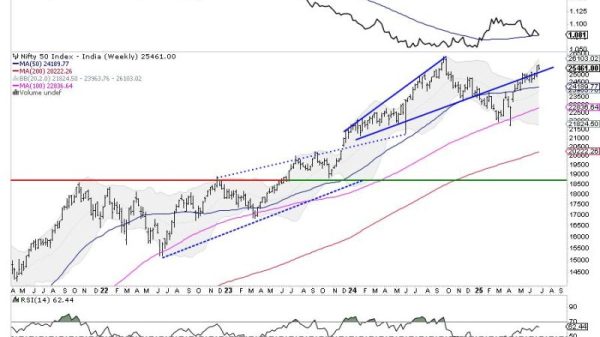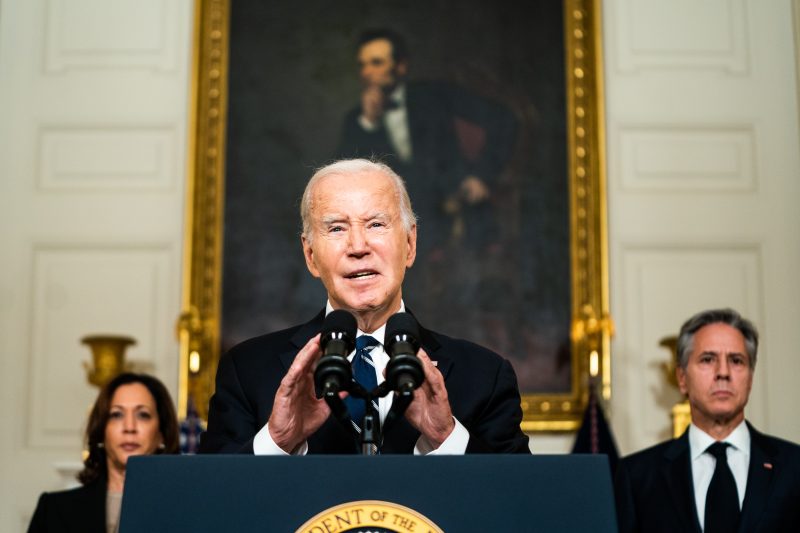After the slaughter of civilians in Israel, President Biden responded with an angry denunciation of the “pure, unadulterated evil” of the terrorists of Hamas and a pledge of unwavering U.S. support for the Israelis. It was a clear reminder of the demands for U.S. leadership in times of crisis around the world.
Meanwhile, on Capitol Hill, warring House Republicans struggled to elect a speaker. The chaos came more than a week after these same Republicans deposed Rep. Kevin McCarthy (R-Calif.) from the position. In a time of crisis abroad and unmet responsibilities at home, Republican infighting caused Congress to remain paralyzed for a second week.
The United States is a country, as others from abroad see it, wrestling with its own demons, looking inward and caught up in narrow pettiness at a time when the world grows more dangerous. As a result, the state of the country is perilous heading into an election year in which the stakes are as high as they’ve been in a very long time.
Biden’s assurances of support for Israel projected the kind of leadership the United States has been expected to provide in the world for generations. House Republicans reminded the world that they are not serious about governing, with implications for the United States’ capacity to fulfill its role internationally.
The turmoil dragging on in the House is a testament to how much the Republican Party under former president Donald Trump has changed politics for the worse. The party’s broader disagreements over the future direction of the country are the rule, not the exception. As a result, Americans are caught up in divisions between the major parties, between red and blue states, between regions and between individuals with opposing ideologies.
After the horrific attacks that were launched last Saturday, there was no choice for Biden but to do what he did. Despite differences with Israel over its treatment of the Palestinians, the United States has historically been Israel’s most loyal friend and staunchest ally. And Israel has been the United States’ most important ally in the Middle East.
Disagreements with Israel’s leadership have been magnified in recent years, badly straining relations. Israel’s right-wing government has sought to weaken the country’s democracy, and Prime Minister Benjamin Netanyahu’s pursuit of such policies has generated an enormous backlash among the people.
Biden and Netanyahu, sometimes friends and sometimes adversaries, found themselves at a moment when those differences had to be set aside in the face of the worst attack on Jews since the Holocaust, and as Israel prepares for what will be a dangerous offensive that begins with the expressed intent of wiping out Hamas as a threat.
Biden made clear that the United States will stand with Israel as a bulwark against the kind of horrific acts perpetrated by Hamas. He pledged the kind of support that will aid in protecting the country, rescuing hostages, including Americans, taken by Hamas in the attacks, and carrying out a war. U.S. officials also continue to emphasize to Israeli leaders that the coming military offensive must be carried out within the boundaries of international law to avoid excessive civilian casualties and suffering in Gaza.
From World War II to the present, the United States’ steadfast leadership has been crucial in almost any clash, hot or cold, between democracy and authoritarianism. After the Cold War ended, the United States operated as the world’s only real superpower. That standing has been challenged by China under its autocratic leader, President Xi Jinping, and by Russian aggression perpetrated by President Vladimir Putin. Iran and North Korea also pose serious threats to the world order.
Putin’s decision to invade Ukraine more than a year ago prompted the Biden administration to rally European allies. The administration was successful even though some allies initially questioned U.S. intelligence that indicated, correctly, that an invasion was coming. The United States has led the alliance to supply the Ukrainians with billions and billions of dollars of weaponry in what has been a steady stream of support.
Now the United States must lead in the support for Israeli military action while trying to prevent the conflict with Hamas from expanding in the region. As with Ukraine, this will require commitment and money, funds approved by Congress. The dysfunctional democracy of the United States stands in the way.
Support for aid to Ukraine has slipped among Republicans in the past 18 months, a drop of 30 percentage points, according to a poll by the Chicago Council on Global Affairs. Republican leaders in the Senate continue to support additional funding for Ukraine, as do some GOP leaders in the House. But others in the House have resisted, among them Rep. Jim Jordan (R-Ohio), who was nominated on Friday by Republicans to be their next speaker, if he can win the necessary votes in a floor vote.
Support for aid to Israel remains strong in Congress. But nothing can get done until first, Republicans elect a new speaker, and then second, Congress confronts the ticking clock on the short-term spending bill that was approved just before McCarthy was deposed by a renegade faction in his party. Congress is a month away from another potential government shutdown, with funding for both Ukraine and Israel caught up in the debate.
No one can say with certainty whether Israel’s internal political divisions contributed to the decision by Hamas terrorists to strike over the weekend, or whether those divisions contributed to what has been called a massive intelligence failure. Israelis are not ready to determine what went wrong as they prosecute the war against Hamas, but that review will come in time. At a minimum, it’s clear that the Israeli leadership was not paying the necessary attention to threats while it was consumed with divisions over its own policies.
Even without an answer, that same question can be applied to the United States. How much have the deep divisions and the lack of seriousness on the part of many Republicans in the House caused others in the world to see the United States as distracted, weakened or simply less able to meet what for so long has been its expectations for leadership?
Trump and many Republicans say it is Biden’s weakness and policies that have left this country vulnerable. They say the chaotic withdrawal from Afghanistan prompted Putin to believe the time was right to attack Ukraine.
A far more worrisome prospect, particularly to those in allied countries, is the possibility that Trump could win the 2024 election. His “America First” rhetoric, his denigration of allies and his coziness with leaders like Putin and North Korea’s Kim Jong Un have turned upside down a foreign policy consensus that existed for more than half a century.
That old consensus was not free of mistakes. Trump’s shift to a harder line toward China, controversial when he first enunciated it, is now the new consensus. But the unpredictability of the former president remains a realistic worry to those in other countries who look to the United States for continued leadership. Trump reminded everyone of his erratic behavior again recently when he criticized Israeli leadership and offered words of praise for Hezbollah, which has close ties to Iran and, like Hamas, has the stated goal of wiping out the Jewish state.
Trump’s words were jarring and discordant, the more so because he could win the White House in 2024. His lead in the Republican nominating contest is significant and so far unchanging. Most indicators about the general election suggest he and Biden could be headed for another close contest in the electoral college next year. The House, under Republican control at least until the end of next year, is likely to continue to pursue policies catering to the hard right at a time when compromise is required.
A dysfunctional Republican Party, an unpopular incumbent president, a volatile and indicted former president facing four trials and 91 felony counts, and ongoing threats to U.S. democracy underscore why the coming election is so consequential. As the world seems to grow more chaotic, Americans will be asked in 13 months to set the country’s direction, internally and externally, for the rest of the decade and perhaps beyond — with eyes around the globe watching closely.







































